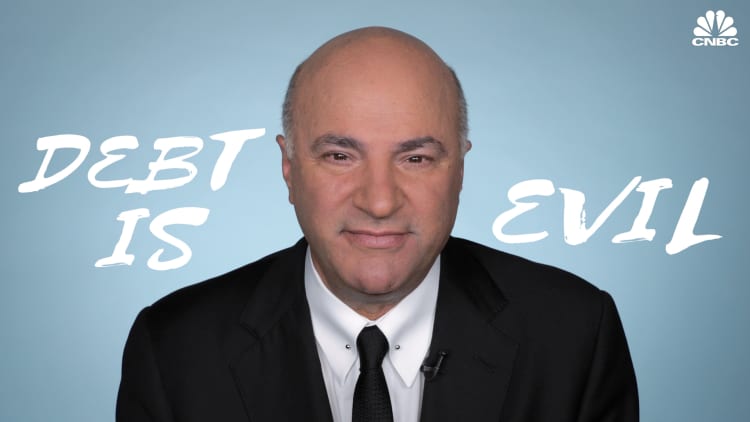Credit cards, student loans, mortgages, car loans, personal loans: Most Americans have a combination of these sources of debt. And despite their best intentions, Americans are digging themselves deeper into a hole each year.
The average American now has about $38,000 in personal debt, excluding home mortgages. That's up $1,000 from a year ago, according to Northwestern Mutual's 2018 Planning & Progress Study, which also reports that "fewer people said they carry 'no debt' this year compared to 2017 (23 percent vs. 27 percent)."
"Despite recognizing that debt is dangerous waters, Americans are jumping in with both feet and struggling to stay afloat," says Emily Holbrook, director of planning for Northwestern Mutual.
Credit cards and mortgages tied as the leading source of debt, followed by student loans and car loans, according to the survey. The findings are based on a survey of over 2,000 U.S. adults, including an oversampling of more than 600 millennials.
Gen Z & younger millennials (ages 18-24): $22,000
For those ages 18 to 24, it's no surprise that student loans are the highest source of debt (28 percent), followed by credit card balances.
At least experts consider student loans to be "good debt," because they are typically low cost and may have tax advantages. Meanwhile, credit card debt is almost always "bad debt," because it has much higher interest rates.
When it comes to student loans, don't take out more, in total, than you believe you will make with your first year's salary, Carrie Schwab-Pomerantz, a financial advisor, board chair and president of the Charles Schwab Foundation, tells CNBC Make It. So if you think you're going to earn $50,000 right out of college, you shouldn't have more than $50,000 in student loans.
Older millennials (ages 25-34): $42,000
Among older millennials, credit card balances are the leading source of debt, making up a fourth of what average older millennials owe. Student debt accounts for about 16 percent, while mortgages make up just 3 percent, according to Northwestern Mutual.
"As you grow older, your expenses increase. The additional pressures that come onto the pocketbook only grow, and your disposable income shrinks in a lot of cases, even if your salary is growing," Holbrook tells CNBC Make It.

Gen X (ages 35-49): $39,000
For those ages 35 to 49, home mortgages are the No. 1 source of debt: They account for about 32 percent of the members of this age group typically owe, the survey finds. Credit card debt is the No. 2 source, while car loans and education debt tie for around 7 percent each.
This era in your life is crunch time, says Kevin O'Leary, personal finance author and co-host of ABC's "Shark Tank." People should aim to have all of their debt paid off — from mortgages to student loans to credit card debt — by age 45, he tells CNBC Make It.
"The reason I say 45 is the turning point, or in your 40s, is because think about a career: Most careers start in early 20s and end in the mid-60s," O'Leary says. "So, when you're 45 years old, the game is more than half over, and you better be out of debt, because you're going to use the rest of the innings in that game to accrue capital."
Baby boomers (age 50+): $36,000
Those who are age 50 or older have the second-lowest amount of debt, which is good news. And similar to Gen-Xers, the top three sources are, in order: mortgages, credit card bills and car loans.
But while they have less debt than millennials and Gen-Xers, many boomers don't have a lot of savings, despite being close to retirement. A third of baby boomers have less than $25,000 put away for their golden years, according to Northwestern Mutual, meaning they could end up working longer than they planned.
Don't miss: Why a 33-year-old turned to a risky loan when his baby's premature birth left him broke
Like this story? Subscribe to CNBC Make It on YouTube!



